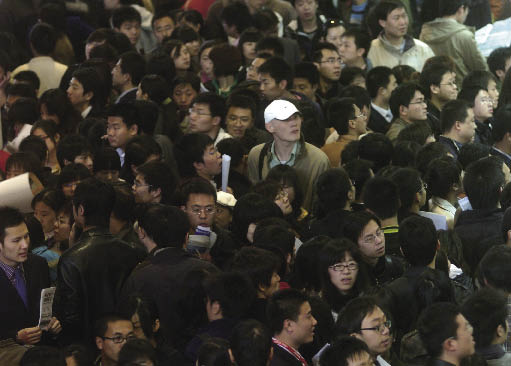| Why Is a Job a Hard Thing to Find?
By staff reporter LIU QIONG
EMPLOYMENT for university graduates has remained a constant headache for the Chinese government since the beginning of the new millennium. MyCOS HR Digital Information Co., Ltd. conducted a survey on the employment situation of university graduates from 2006 to 2008, and its subsequent report, The 2009 Employment Blue Book of University Graduates, shows that even when the job market was performing well, the employment rate for fresh graduates remained low. One-third of university graduates and 40 percent of advanced vocational school graduates only managed to find a job some time after finishing their studies.
"The expansion of Chinese university enrolment began in 1999. When the first crop of students after the expansion left school in 2003, employment difficulties for university graduates started emerging," says Dr. Wang Boqing, CEO of MyCOS.
 |
| Volumes of competition at an overcrowded job fair in Beijing. |
Demand-Supply Discrepancies
Many blame enrolment expansion for rising graduate unemployment. At the 2009 Employment Blue Book issuance conference in June, Prof. Chen Yu, vice president of the China Association for Employment Promotion and president of the China Institute of Occupational Research affiliated with Peking University, stated, "The number of university graduates was 1 million in 2002, and increased to 1.6 million in 2003. This year the figure will reach 6.1 million, an increase of 600 percent in seven years. With the world's largest population of university graduates, China is under constant pressure to provide them with jobs."
However, Chen Yu disagrees that enrolment expansion is the root cause for rising unemployment amongst college graduates. "China is at the lower levels of the international division of labor, so job vacancies tend to be in labor-intensive industries. The shortage of white-collar positions is the main reason why university graduates find it hard to get the jobs they desire."
Some people blame the world financial crisis for the cold spell on the domestic white collar human resources market. However, the downturn has barely been felt among graduates from vocational schools. Compared with 2007, the employment rate for university graduates in 2008 dropped by 3 percent, while that of advanced vocational school graduates remained steady. "China's low-added-value, labor-intensive industrial structure does not generally require a high-quality workforce, as indicated by the 95-99 percent graduate employment rate that intermediate vocational and secondary technical schools have maintained in recent years," says Chen Yu.
| 